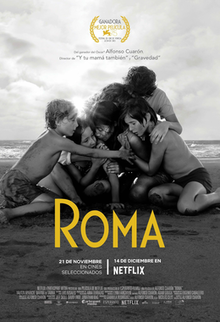 Roma (2018) — Mexico
Roma (2018) — Mexico
This black and white dramatic memoir received ten Oscar nominations, including Best Picture and four nominations for Alfonso Cuarón as the producer, writer, cinematographer, and editor. There are different ways to watch the film, but Cuarón makes his intentions clear at the end of the movie when, as the credits begin to roll, he dedicates it por Libo, that is, in loving memory of his real life nanny Liboria Rodríguez, who served his family when he was a little boy. The protagonist in the film is a Mixteco girl named Cleo, who like many people from her indigenous background has left her own family in the impoverished countryside to find a better life in the city. She is the live-in maid for a family of seven in the Roma neighborhood of Mexico City (where Cuarón grew up) around 1970. On the one hand, because of her background, Cleo is a powerless person who is subject to socioeconomic forces far beyond her control. On the other hand, her life as a maid is a vast improvement, thanks to good money for reasonable work in a loving city family. Cleo is also a savior and hero. She loves the family's four children more than her own. But whether rich or poor, suffering often knocks at all of our doors. At about the same time in this movie, the two women, Cleo and her employer, the mother Sofia, both suffer bitter treatment by their men. No wonder the film includes scenes of an earthquake, hail, a forest fire, and a pounding ocean surf that will suck you right under. I watched this film on Netflix Streaming.
Dan Clendenin: dan@journeywithjesus.net


